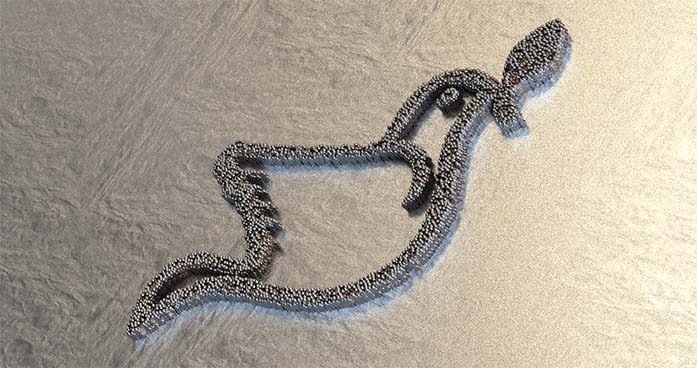
The company’s commitment to respecting and upholding human rights is enshrined in detail in the chapter of voestalpine’s Code of Conduct entitled “Respect and Integrity.” Human rights are also a key element of voestalpine’s binding Code of Conduct for Business Partners.
Training
To ensure that human rights are respected and upheld, an online training program is being developed in collaboration with renowned experts. It is designed to sensitize all of the company’s employees to their heightened responsibility for compliance with human rights and gives them important information and instructions on how to act.
This is the content of the online learning modules:
- Overview of voestalpine’s CR Activities
- General Introduction to and Explanation of the Concept of “Human Rights”
- Human Rights in Day-to-Day Work
- Working Conditions and Non-Discrimination
- Human Rights in the Supply Chain
UN Global Compact – The 10 Principles
Human rights
Principle 1: Businesses should support and respect the protection of internationally proclaimed human rights; and
Principle 2: make sure that they are not complicit in human rights abuses.
Labor standards
Principle 3: Businesses should uphold the freedom of association and the effective recognition of the right to collective bargaining;
Principle 4: fight for the elimination of all forms of forced and bonded labor;
Principle 5: the effective abolition of child labor; and
Principle 6: the elimination of discrimination in respect of employment and occupation.
Environmental protection
Principle 7: Businesses should support a precautionary approach to environmental challenges;
Principle 8: undertake initiatives to promote greater environmental responsibility; and
Principle 9: encourage the development and diffusion of environmentally friendly technologies.
Fight against corruption
Principle 10: Businesses should work against corruption in all its forms, including extortion and bribery.
By signing the Code of Conduct for Business Partners as required, business partners undertake to respect and comply with human rights as fundamental values on the basis of the European Convention on Human Rights and the UN Charter. In particular, this applies to the prohibition of child and forced labor; the equal treatment of employees; and the right to employee representation and collective bargaining.
Collective bargaining and the right to freedom of association
About 80% of all of voestalpine’s employees are in an employment relationship that is governed by a collective agreement. Every employee has the freedom and right to join a union. The workforce in all voestalpine companies may elect representatives to the works councils. The voestalpine Group has both a European Works Council and a Group Works Council, which maintain good communications with management.
Child labor and forced labor
voestalpine strictly prohibits child, forced, and bonded labor. So far, no case of any such practices has been recorded anywhere in the Group. Nor does voestalpine tolerate any form of child, forced, and bonded labor at its suppliers and business partners. As part of the company’s investigation of the supply chain (Sustainable Supply Chain Management (SSCM)), suppliers are evaluated in targeted fashion as to compliance with human rights and, specifically, the prohibition of child, forced, and bonded labor.
Human trafficking and modern slavery
Companies of the voestalpine Group that are subject to the UK Modern Slavery Act fulfil the Act’s prescribed requirements by publishing a statement to that effect. Both the Code of Conduct and the Code of Conduct for Business Partners explicitly mention and expressly prohibit human trafficking and modern slavery.
Human rights training for security personnel
voestalpine’s plant security staff largely comprises the company’s own employees. Just as the employees of third-party entities, they too are subject to the Code of Conduct. The third-party entities themselves are subject to the Code of Conduct for Business Partners. Both documents mandate compliance with human rights.
voestalpine provides human rights training for its own employees; external security personnel are trained by their own employers.
Rights of indigenous peoples
As voestalpine operates solely in developed industrial areas, its business operations do not in any way impinge on the rights of aboriginal people.

